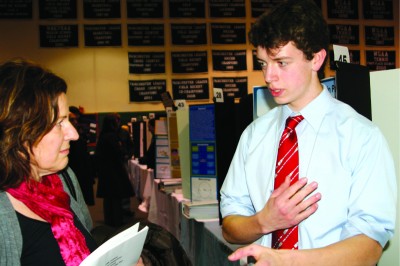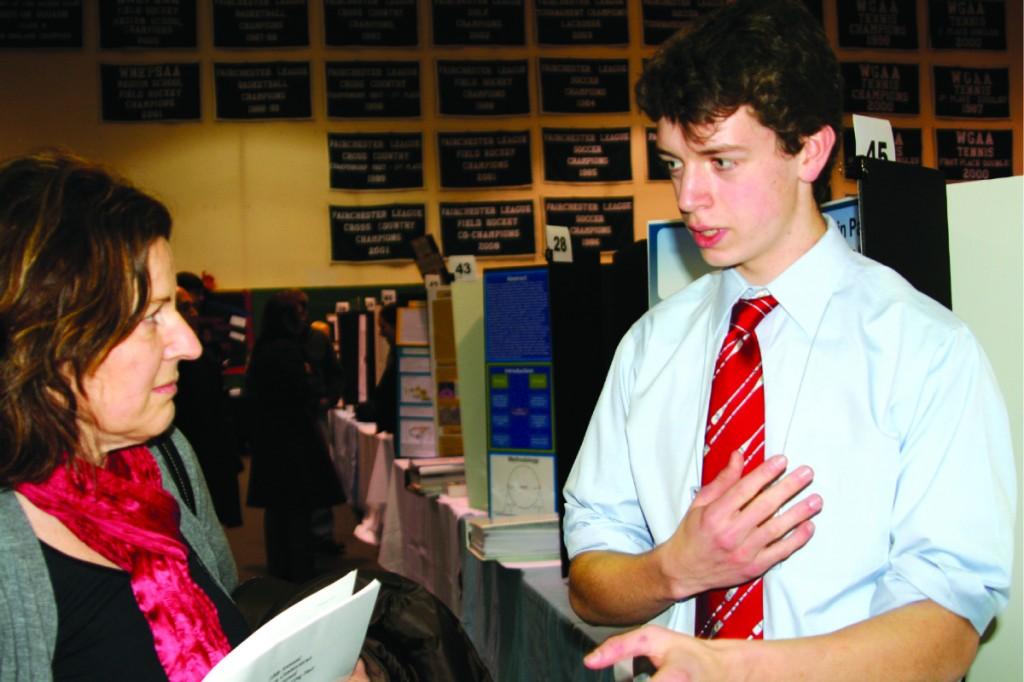
Stevie Klein ’12
Web A&E Editor
On Feb. 6, students from Staples, Amity Regional High School in Woodbridge, Darien High School and Convent of the Sacred Heart in Greenwich, shared their scientific findings at the 10th annual Southern Connecticut Invitational Science and Engineering Fair.
Each student either competed in life science, physical science (including chemistry, computer science, earth science, engineering, mathematics, physics and space science), or research proposal for projects in the planning phases.
There were 130 projects and 150 judges at the event. To compete at the fair, a student had to have been enrolled in the science and research program at their school.
“Before [the fair and southern Connecticut science and engineering foundation started], Westport was strong in the arts but the science programs were weak,” Bill Foster, the southern Connecticut science and engineering foundation president who started the fair in 2000, said.
Dr. Harry Rosvally, chairman of the science department for the Westport School District from 2000–2008, was told to improve the science program at Staples. Dr. AJ Scheetz and later Dr. Nick Morgan took over the ASR program at Staples and developed it into the class offered today.
“I want students to discover that they know more about their subject then anyone else in the room,” Scheetz said. “It shows they have made astounding progress.”
A total of 59 Staples students are in the ASR program and many of them participated in the fair. Most students competed in the proposal category as they have not finished their research or completed their experimentation.
For example, Jay Tsai ’12 had a topic of efficient hydrogen production using the hydrogenase enzyme in algae. His project is finding out whether algae are a good source for producing hydrogen.
“ASR is a good way to search and follow my interests,” Tsai said.
Only a few students have finished their project completely. Jessica Davis ’10, who worked at Yale for nine weeks with a graduate student, won in the category of life science.
Her project was on the characterization of cyclic di–GMP class II riboswitches. Riboswitches, made of RNA, are capable of controlling gene expression without the use of proteins.
“It feels really great to be done with the project. Working in a lab all summer and commuting every day was kind of a bummer, but definitely worth it,” Davis said. “I learned far more than I would have ever imagined and really felt like I accomplished something. Researching at Yale and completing my research project was unlike any other achievement I’ve accomplished at Staples or otherwise.”
Davis recently showed that a recently discovered unidentified section of RNA was, in fact, a riboswitch capable of controlling downstream reporter genes and was related to second messenger cyclic di–GMP.
Fran Lichtenberg, coordinator of judges, put together 50 teams, each consisting of three judges, to judge the different projects. These interdisciplinary teams have one member that will be an expert on the type of science of the student’s project, and the other two will be able to understand it from their own science knowledge.
The students who have completed science or engineering projects are graded on problem definition, literature review, experimental design, conduct of study, interpretation of results, originality and creativity, project display and oral presentation.
The students who have research proposals are graded on problem definition, literature review, understanding of supporting information, future plans and ideas, originality and creativity, project display and oral presentation.













































